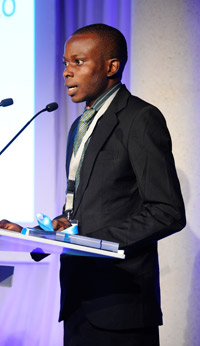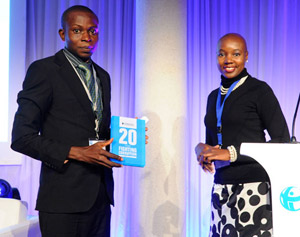If young people want to see change in the world, they have to realise the battle against corruption starts with them – they must resolve to do the right thing. This is the message from Nigeria’s Ugoh Wilson Emenike, 23, the winner of our 20th anniversary youth writing competition.
Emenike’s essay is a semi-fictional account of a youngster who loses respect for a highly regarded teacher after he connives with a supplier and inflates the price of sporting equipment to “get his slice of the cake”. After leaving school, the youngster takes a stand against the endemic corruption he experienced by resisting to pay a bribe to get into college. Read the full story here.
We chatted with Emenike when he was in Berlin recently to accept his prize at Transparency International’s 20th Anniversary Celebrations. Here are some of his insights on the power of story-telling and the importance of setting an example:
How can creative writing be used as a tool to fight corruption:
Writing is a way of drawing people in and giving them information about issues that are a problem in society, like corruption. If your writing is interesting and creative, you can pass your message across effectively. When people don’t realise that corruption is a problem, they don’t think of ways to solve it. Story-telling helps to make people more aware.
What was the reaction back home in Nigeria after you won this competition?
There was a big reaction – my essay was publicised widely in the newspapers and online. I was also contacted by a number of people who wanted to talk to me about it. One man’s reaction said it all: “If there is one area in society where change should start, it’s the education system. But when young people in the education system are exposed to corruption as if it’s a normal part of life, you’ll get a lot of problems.” People can now see that there are individuals like me who are not comfortable with corruption – that may change their thinking and attitudes. I hope that will help to make a difference.
Why did you decide to enter the competition?
I saw the competition as an opportunity for me to speak out about a very personal problem – the problem of corruption. Although the essay is a work of fiction, I have experienced all these events in my own life – you could say I am the main character. When money meant for paying lecturers goes missing and those lecturers go on strike for months, young people like myself are affected. These young people can no longer attend classes and some can’t even graduate. Their futures are being jeopardised by corruption.
What is your advice to other youngsters who encounter corruption in their daily lives in Nigeria?
In order to fight corruption, you have to recognise it as a problem first. Then you must make the decision to change. You can’t make the change when you’re not ready for it – beating corruption requires a change of attitude. You can’t just keep on complaining things are wrong – you must actively resolve not to indulge in corruption.
Where to from here?
I want to continue the fight. I want to continue telling stories. My weapon remains my writing – I will keep on telling people corruption is not right, and turn my messages into stories so they draw people in.
It’s important that we talk about issues of corruption in Nigeria, so people know what’s happening there. I hope my writing puts it in the spotlight.
More about Ugoh Wilson Emenike
Ugoh Wilson Emenike is a youth activist, writer and teacher from Ebonyi State, Nigeria. Although he comes from an economically disadvantaged background, Emenike says he believes that there is no limit to what one can achieve with determination. He works with a faith-based organisation to help young people develop their potential and make a positive impact on society. Emenike says his interest in corruption developed from his realisation that it can be the root cause of many challenges that youth face globally, including unemployment.
Carousel image: Copyright, Transparency International

















 Connect with us on Facebook
Connect with us on Facebook Follow us on Twitter
Follow us on Twitter